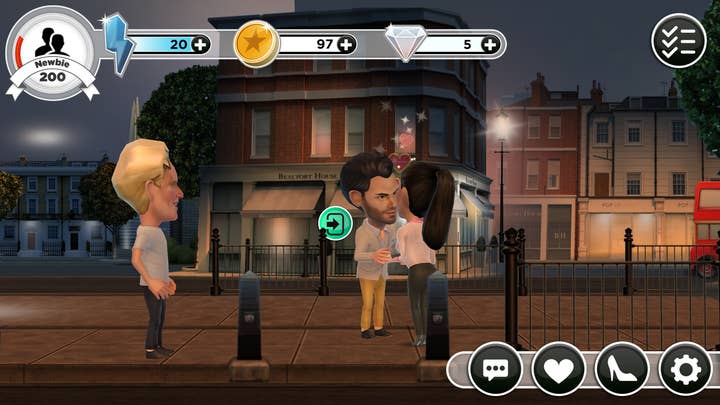“You can't just slap on an IP and cross your fingers”
Channel 4's Colin MacDonald discusses the common pitfalls of celebrity based games, and how having a famous brand can sometimes work against you
Ever since Kim Kardashian conquered the world with a highly lucrative, absurdly popular mobile game, more and more developers have become convinced (or are being told) that a famous brand is essential to success.
Even aside from Glu's output, desperately trying to recapture the magic of Mrs Kardashian-West's games debut, the number of developers using celebrities as the cover star to sell an app seems to be increasing - and that's not even taking into account the number of toy brands, TV shows and other IP that are being used to draw in fans from larger, more established audiences.
But, as even Glu will tell you, building a game around an IP is no guarantee of success. It's a lesson Channel 4 has learned in its efforts to establish a thriving mobile publishing business under the banner All 4 Games, which not only helps bring new IP to market but also gives developers access to properties owned by the broadcaster. While some of the label's titles have proven to be popular, others have actually been held back by the brand which was attached to increase its appeal.

A prime example is the Hollyoaks game, a match-3 puzzler that appeals to fans with storylines that tie into the soap opera and the chance to interact with characters from the show. While it got to No.3 in the App Store charts at home, the game (in the words of head of All 4 Games Colin MacDonald) "did bugger all outside the UK".
"I think it comes down to how tightly the game is associated with its IP," he tells GamesIndustry.biz "For something like Hollyoaks, it's absolutely integral: the game had to be about characters and tell side stories to the main narratives of the show."
That makes sense given that Hollyoaks airs primarily in the UK, limiting its audience overseas, but an earlier surprise success has convinced Channel 4 to release all of its mobile games in multiple territories.
"With Hollyoaks, I think we tied ourselves too closely to the specifics of the show, and it meant if you didn't know the characters or that world, it wasn't that interesting. We hamstrung ourselves"
The Snowman & The Snowdog, based on the sequel to Raymond Briggs' classic children's story, is also a brand with a predominantly British audience - and yet All 4 Games' mobile tie-in saw over one million downloads - in China of all places.
"That might be a bit of an exception," MacDonald admits. "We launched it at Christmas so whether you knew the brand or not, if you were feeling festive, you might be downloading a Christmassy game anyway and it was a lovely game.
"It highlighted that we can launch something globally and in countries where there's absolutely no awareness of the brand. The film isn't shown there, the book isn't available, but we had phenomenal, disproportionate numbers of downloads because it was a good game. That was the part where I started looking at the rest of our portfolio and rather just launching, say, the Hollyoaks game only in the UK, we'd launch it globally."
A more recent release has proved that The Snowman & The Snowdog was no fluke. More than 80% of downloads for Eden: The Game - based on the reality TV series where participants are spending a year building a self-sufficient community in a remote part of Scotland - came from outside the UK. The reason, MacDonald suggests, is it stands up just as well as a game in its own right as it does as a tie-in. Through community management, Channel 4 has learned that some of its most avid players weren't even aware that Eden was a TV show.

"It was much less established as an IP," MacDonald continues. "We did a resource management game based on Eden and, yes it's based on an IP, but we built that game before the show was even edited. We were basing it on early rushes of the show, phone calls about what might and might not happen - we had so much more freedom with what we could do with the game. We just did something that was a great game in its own right, and was less tied to the IP.
"The most successful games based on IP are always ones where the developers had a lot of freedom: Goldeneye, the Batman: Arkham games, and so on"
"The most successful games based on IP are always ones where the developers had a lot of freedom: Goldeneye, the Batman: Arkham games, and so on. Titles like those are always quite different from the film, the book or whatever they're based on, and the developer has been trusted to do something that's right for interactivity. We have quite a lot of freedom with how we can do our games - the TV companies know that I don't turn out rubbish games.
"With Hollyoaks, I think we tied ourselves too closely to the specifics of the show, and it meant if you didn't know the characters or that world, it wasn't that interesting. We hamstrung ourselves. But with Eden we didn't have that choice. We just knew a few things about the IP and tried to make the best game possible. That's led to it doing most of its downloads outside of the UK because it's just a great game. It's polished, it happens to be based on our world so there's a certain degree of cohesiveness - and if you don't know the characters from the Eden show, who cares?"
The success of Eden and The Snowman outside their home territories does seem to suggest that the power of brands on mobile has become a little exaggerated. Despite more and more developers turning to celebrity-based games, few studios have managed to generate the sort of revenues raised by Kim Kardashian: Hollywood. Even its creator Glu has suffered financially after releasing titles based on icons such as Katy Perry, Britney Spears and James Bond and failing to achieve the same success. Are these studios being misled into believing that a brand will solve all their problems?
"People forget just how much Kim Kardashian herself brought to the party. It wasn't just her name, it was the route to market"
"Yeah, totally," says MacDonald. "The thing to remember is there's a scale of popularity when it comes to brands, and you have to question how much of a brand's audience might buy a game around it. With something like Kim Kardashian, she's a massive brand and it seems like a huge portion of her audience is playing games on mobile devices. But are those people going onto the App Store and searching for her? The people specifically searching for Kim Kardashian, or whoever - that's a pretty small percentage of people.
"Kim Kardashian has this huge social reach. I've forgotten the numbers but however many million Twitter followers..." - [At the time of writing, it's 49.9 million] - "so she was not just a brand but a direct route to the market. Yes, if you have a brand you'll get some people searching for you but most people can't download a game if they don't know about it. You still need to reach those people, you still need that channel.
"You can't just stick an IP on something and cross your fingers. There still needs to be that awareness. It's part of the solution, but I think people forget just how much Kim Kardashian herself brought to the party. It wasn't just her name, it was the route to market."

Going forwards, Channel 4 plans to continue launching games internationally, but ensuring a title is of a high quality isn't enough to guarantee success - even with the power of a popular brand behind it. Making it accessible to audiences in different territories is also vital.
"You need to understand why a brand works, what the essence is. Otherwise you'll just end up with very superficial games that the fans will just see right through"
"We obviously still focus on the UK, but we now do everything in 13 languages where we can because you never know when IP is going to take off," says MacDonald. "If you only do something in English, app stores can't give you a featured spot in Asia, they can't even feature you in Spain or France. We do 13 languages and they can go 'great, this is an awesome game, we can feature it in all these countries, and that saves us scrabbling around trying to find something else'. I like to think I'm making the app stores' decision to feature us easier."
Through Eden and Hollyoaks, All 4 Games has learned plenty about in making branded games a success on mobile, but MacDonald stresses there's one vitally important lesson other developers should take away if they wish to avoid making the same mistakes Channel 4 did with the soap-based match-3 puzzler: don't assume you know what an IP is all about until you work with the people behind it.
"The magic word for me is 'essence'," he says. "You need to find out what the essence of the IP is. We did a game for Made In Chelsea - it's quite a polarising show, you either love it or hate it, but it's such a big brand for Channel 4 it was an obvious one for us to look at. The demographic was also a gaming demographic.
"So I watched a couple of episodes of that, and I remember to this day that my notes said it was all about money, location, shopping, getting drunk and all that kind of stuff. Then I met the production company, and even though I thought I knew what the show was about, I just asked them what they thought the essence of Made In Chelsea was. And they said it's not about the money or the sex or the drinking - it's about the exchange of gossip. The fact that the gossip is about the sex, the drinking, the money or the holidays and so on is kind of secondary.
"That was quite an eye-opener. We could have been every easily distracted by making a holidaying, drinking, shagging game, without realising that the essence is the exchange of gossip. That's now the thing we look at for all our games, finding the people who really understand what the essence is. Not me looking at it, because I'm not a TV person, and not what viewers might think it's about, who might just see the superficial stuff. You need someone who understand why it works as television, what the essence is - then take that and find a way to apply it to games. Otherwise you'll just end up with very superficial games that the fans will just see right through."
